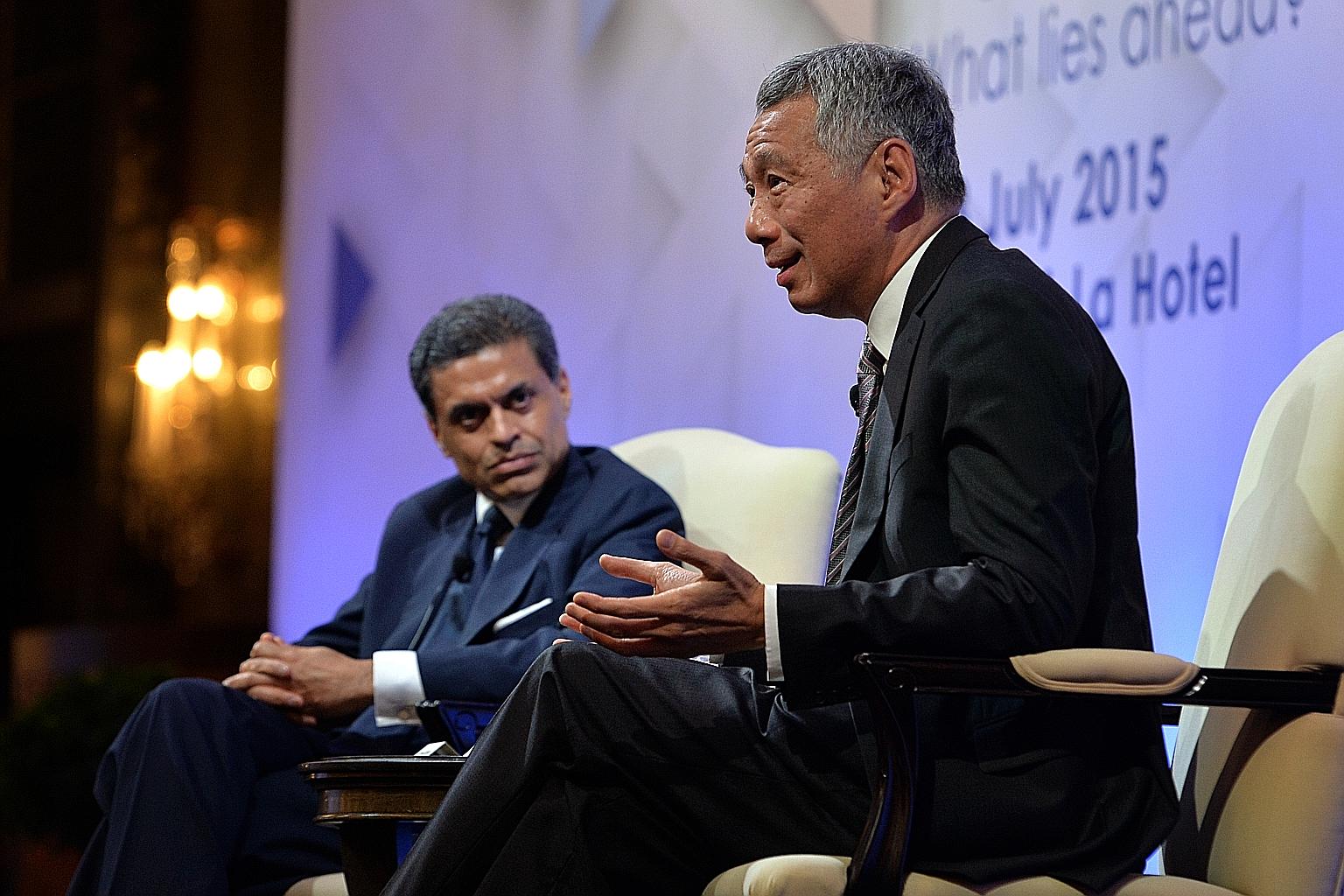S'pore political system is one that benefits all: PM
Govt sees its job as looking after as many as possible, not just catering to certain groups
Sign up now: Get ST's newsletters delivered to your inbox

PM Lee Hsien Loong at a dialogue hosted by columnist Fareed Zakaria at an Institute of Policy Studies conference yesterday. Asked by Mr Zakaria if Singapore needed to embrace a "culture of disrespect" in order to become more economically vibrant, Mr Lee responded that anarchy does not guarantee brilliance - and that Singapore is not as orderly as outsiders seem to think.
ST PHOTO: CAROLINE CHIA
Rachel Chang
Follow topic:
Singapore's political system has remained continually dominated by one party, even though this may be unusual for developed economies, because it is a system from which everyone benefits, Prime Minister Lee Hsien Loong said yesterday.
Unlike many other governments whose policies are tailored towards certain groups, the Singapore Government sees its job as "to look after as large a proportion of the population as possible, while still giving people the incentive to vote for this Government, so that they will get some benefit from it", Mr Lee said.
"I have a multiracial mix (in population) but I have a mix where everybody has benefited from the system, where everybody has a stake and can see that it is working for us. And it has prevailed so far," he said.
Speaking at a dialogue hosted by Washington Post columnist Fareed Zakaria at an Institute of Policy Studies conference themed Singapore At 50: What Lies Ahead?, PM Lee resisted Mr Zakaria's characterisation of Singapore as one of the only developed economies in the world that has not transitioned to a multi-party liberal democracy.
"We are a multi-party liberal democratic system," Mr Lee said. "The outcome is not what you would like to see, but that is what Singaporean voters have decided."
But he noted that the ruling People's Action Party does not wholly disregard politics: "If we take the view that if you voted against me, I should help you first (as) that shows my largeness of spirit, then I think you will go extinct as a government."
In the hour-long dialogue at the start of a two-day conference on Singapore's post-jubilee future, PM Lee staunchly defended Singapore's legal constraints on defamation, and racial and religious offence.
Asked by Mr Zakaria if Singapore needed to embrace a "culture of disrespect" in order to become more economically vibrant, Mr Lee responded that anarchy does not guarantee brilliance - and that Singapore is not as orderly as outsiders seem to think.
"I spent six hours in court. If this were a very orderly place, would I have to do that?" he said to laughter from the 640-strong audience at the Shangri-La Hotel. A day earlier, Mr Lee was cross-examined for six hours by blogger Roy Ngerng, whom he had sued for defamation.
Later, when one participant criticised the harsh treatment meted out to Mr Ngerng, as well as to teenager Amos Yee, who was found guilty of uploading an obscene image and making remarks intended to hurt the feelings of Christians, Mr Lee said Singapore has limits to free speech, like many other countries.
"You can say and discuss anything you like, but you can't defame anybody you like," he said. "If you can't redress defamation, then how can I clear my name when somebody defames me?"
Despite the multiracial fabric of modern-day Singapore, racial and religious sensitivities will never go away, Mr Lee said.
"You can give offence even without intending to, so when you intend to give offence, I think we have to act against it," he said.
Mr Lee added that young Singaporeans do not lack the drive and hunger of their forebears, but are missing an understanding of the real vulnerability that race and religion remain for the nation.
"The problem has not gone. Religion has become more prominent (and) everybody's more conscious of their identity," he said. A terror attack would also tear Singapore apart, as the suspicion and fear generated will change people's interactions with one another for a long time, he added.
Crediting Singapore's success to "good luck, good history and good leadership", Mr Lee acknowledged that the Government is "worried all the time (so much so) that people say we are paranoid".
But the success tiny Singapore has had is "an entirely unnatural state of affairs", he said.
"And one we should count our blessings for, if not every day, then every election!"

